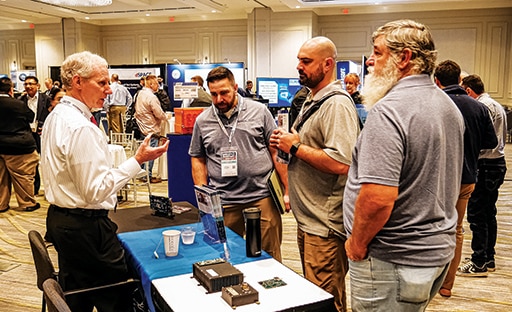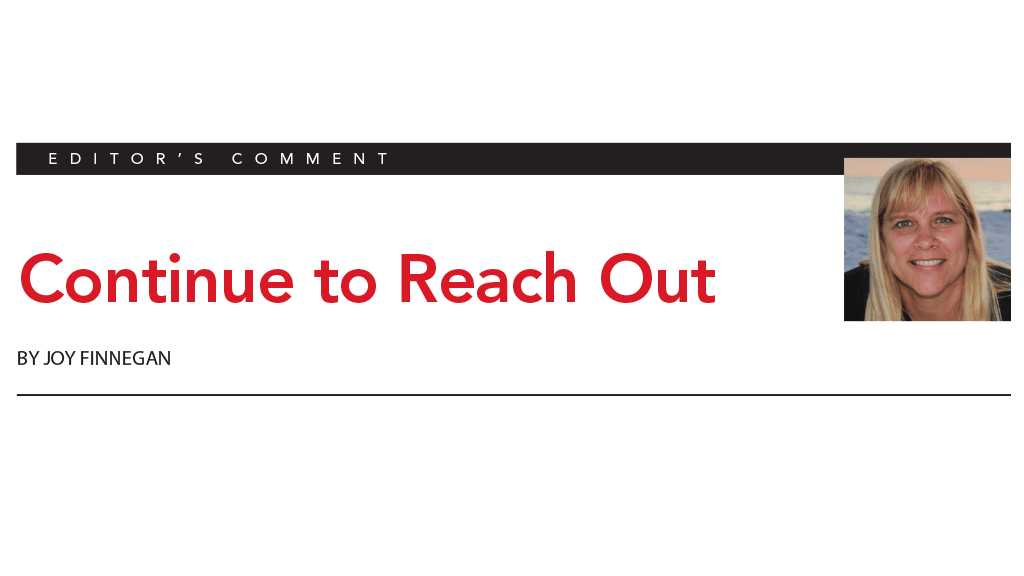For years, the parent company of this magazine has been hosting a conference and exhibition annually in Munich, Germany. Years ago it was called The Avionics Show but most recently it was dubbed Aerospace Tech Week and we launched a magazine to go alongside of the event called Aerospace Tech Review. Both the event and the magazine cover areas like avionics, connectivity, flight operations IT, MRO IT, aerospace testing, space and aerospace innovations. You can check out the sister publication at www.aerospacetechreview.com.
During the pandemic days, the European event was postponed and finally ran in March of this year in Toulouse, France. Before the shutdown of travel in 2020, we were making plans to have a U. S. version. Those plans were put on hold but, happily, they finally came to fruition this month on November 8 and 9 in Atlanta, Georgia. We had a great event with some truly amazing speakers, presentations, training and exhibitors. Most of all, it was wonderful to be back together, in person, to learn and grow.
One session talked about the benefits of blockchain technology for MRO. Another session included speakers from United Airlines, INFORM — a German company specializing in artificial intelligence and machine learning, Colombian engineering firm SkyOn Aeroengineering and IATA’s head of operational cost management, Dr. Chris Markou.
One track focused on sustainability with numerous sessions, including one that targeted optimizing fuel efficiencies and featured presentations from Collins Aerospace, GE Digital and Honeywell Aerospace, while other tracks looked at the latest in connectivity, testing and avionics.
In our opening keynote session we heard from Rick Uber, managing director of airframe maintenance at Delta Air Lines. Rick gave his insights on the state of our industry, talking about where the industry stands with the challenges of labor force shortages, capacity shortages and supply chain bottlenecks. He shared lessons learned from the airlines’ response to covid and the drive to digitize in MRO.
We were fortunate to have Dr. Alicia Taylor, program director of the Open Group FACE Consortium. The Open Group is an international vendor- and technology-neutral consortium leading the development of technology standards, certifications and best practices. The Future Airborne Capability Environment, or FACE Consortium, collaborates on developing open software standards to innovate processes and practices, and accelerate FACE adoption. It was announced that they are opening membership internationally, with Australia, Canada, New Zealand and the United Kingdom eligible for membership. The move came in response to a growing demand from both businesses, the U. S. and other governments, as international cooperation grows in importance.
Another one of our keynote speakers was Skyler Shuford, founder and COO of the company Hermeus, located in Atlanta. Hermeus is working towards creating a hypersonic aircraft that will fly at Mach 5, more than twice the speed of the supersonic Concorde. Their goal is to make flying from New York to Paris a quick 90 minute hop.

Within the last 18 months Hermeus has built a 110,000 sq ft. factory, transformed an open field into a test facility, conducted more than 100 engine tests, designed and constructed a prototype of its first aircraft, and tested a full-scale proprietary Mach 5 engine. The company also raised $100 million to continue on the difficult journey of design and creation.
Seeing Skyler Shuford speak about his, and his co-founders’ passion, inspired me. He was matter of fact and frank about the fact that along the way, there will be failures. But, he also reminded all that we learn from our failures.
His words made me remember a story from the history of manned powered flight. In October of 1903, a mere two months before the Wright Brothers successfully flew at Kitty Hawk, N. C., Samuel Langley, secretary of the Smithsonian Institution, conceived and built a full-scale aircraft that was named the Great Aerodrome. It was loaded on a tall houseboat on the Potomac River, and made ready for takeoff. Smaller versions of it had flown briefly, unmanned, twice before. With news reporters watching and photographers taking pictures, it was launched, but sadly collapsed and fell into the water. Less than 10 days later, the Wright brothers flew.
As a well-known public figure, Langley was excoriated by the press for his very public failure. But Wilbur Wright, when asked about this attempt and the subsequent humiliation of a fellow inventor, called it “shameful.” And added that, “His work deserved neither abuse nor apology.” I hope all will keep this in mind as we head out into new unknown territories whether it be in hypersonic attempts or advanced air mobility. We need to encourage growth, development and invention at the highest levels. Even when that includes failure. As Benjamin Franklin said, “Do not fear mistakes. You will know failure. Continue to reach out.”
If you weren’t able to join us in Atlanta this time, please consider coming to Munich on March 29-30, 2023 or once again in Atlanta on November 14-15, 2023.
